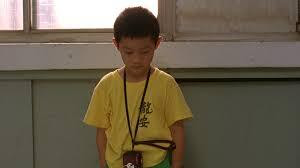Yi Yi: A One and a Two (2000), directed by Edward Yang, is a delicate and introspective Taiwanese family drama that explores the complexities of life through the lens of a single family in modern Taipei. The film follows NJ (Nianzhen Wu), a middle-aged businessman grappling with personal and professional crises, his wife Min-Min (Elaine Jin), daughter Ting-Ting (Kelly Lee), and young son Yang-Yang (Jonathan Chang). Through their experiences, the film examines the emotional and existential struggles of each character as they navigate love, regret, loss, and the passage of time.
The film’s narrative unfolds slowly, presenting the audience with a poignant slice of life. NJ reconnects with a former lover while facing challenges at work; Ting-Ting experiences the pangs of first love and guilt; Min-Min suffers a breakdown as she feels overwhelmed by the monotony of life; and young Yang-Yang grapples with philosophical questions about existence. Each character represents a different stage of life, and their individual stories are interwoven into a rich tapestry of family life, showing how personal choices and circumstances affect everyone around them.
Yi Yi is both an intimate family portrait and a profound meditation on the meaning of life and human connection. Edward Yang’s precise direction and deep sensitivity bring out the universal emotions that resonate across generations, making this film an emotionally rich and thoughtful cinematic experience.
Plot Highlights
The film begins with a wedding and ends with a funeral, framing the cyclical nature of life. NJ, a quiet and introspective man, faces a midlife crisis as his company struggles financially, and he rekindles a friendship with his first love. His wife Min-Min leaves to seek spiritual guidance after her mother falls into a coma, leaving their teenage daughter Ting-Ting to care for the house and deal with her own teenage dramas. Young Yang-Yang, curious and philosophical, explores the world through his camera, asking questions about life that reflect the film’s larger themes. Each family member's experiences converge in subtle ways, highlighting the impact of life’s ordinary moments on the larger human experience.
Theme
The central theme of Yi Yi is the complexity and beauty of ordinary life. The film delves into the small moments that make up human existence—love, loss, regrets, and the search for meaning—showing how these experiences resonate through different generations. Another important theme is the passage of time and how it affects human relationships. Edward Yang uses the family dynamic to explore how individuals change over time and how their interactions with each other evolve. Self-discovery and personal growth are also key themes, as each character grapples with their identity, purpose, and place in the world.
Character Analysis
NJ (Nianzhen Wu): NJ is the emotional anchor of the film, representing the internal struggles of adulthood. He is a contemplative man, balancing the demands of his family, his work, and his own unfulfilled desires. His rekindling of a past romance forces him to confront his regrets and question the choices he has made in life, reflecting the universal theme of midlife crisis and introspection.
Ting-Ting (Kelly Lee): Ting-Ting embodies the confusion and emotional intensity of adolescence. As she deals with the guilt over her grandmother’s accident and navigates her first experience of love, her character explores the vulnerability and self-doubt that often accompany growing up.
Yang-Yang (Jonathan Chang): Yang-Yang, the youngest character, is wise beyond his years, constantly asking philosophical questions about life and perception. His childlike curiosity is central to the film’s exploration of existential themes, as he represents innocence and the boundless curiosity of youth.
Min-Min (Elaine Jin): Min-Min’s character illustrates the emotional weight of adult responsibilities. Feeling trapped in the routine of her life, she seeks spiritual enlightenment but ultimately represents the emotional exhaustion that can come with caregiving and domestic life.
Reception and Impact
Yi Yi was met with widespread critical acclaim and is considered one of the greatest films of the 21st century. It won the Best Director award for Edward Yang at the Cannes Film Festival in 2000, solidifying his reputation as a master filmmaker. The film's exploration of universal themes like family, love, and the passage of time resonated deeply with audiences and critics alike. Its slow, reflective pacing and attention to emotional detail have made it a touchstone in the canon of world cinema.
The film’s impact on Taiwanese cinema and international arthouse film was significant. It is praised for its realistic portrayal of middle-class life, its philosophical depth, and its ability to capture the nuances of everyday existence. Yi Yi remains an essential film for those interested in meditative, humanistic storytelling and continues to be celebrated for its emotional complexity and insight into the human condition.



.jpg)
.jpg)
.jpg)
Post a Comment